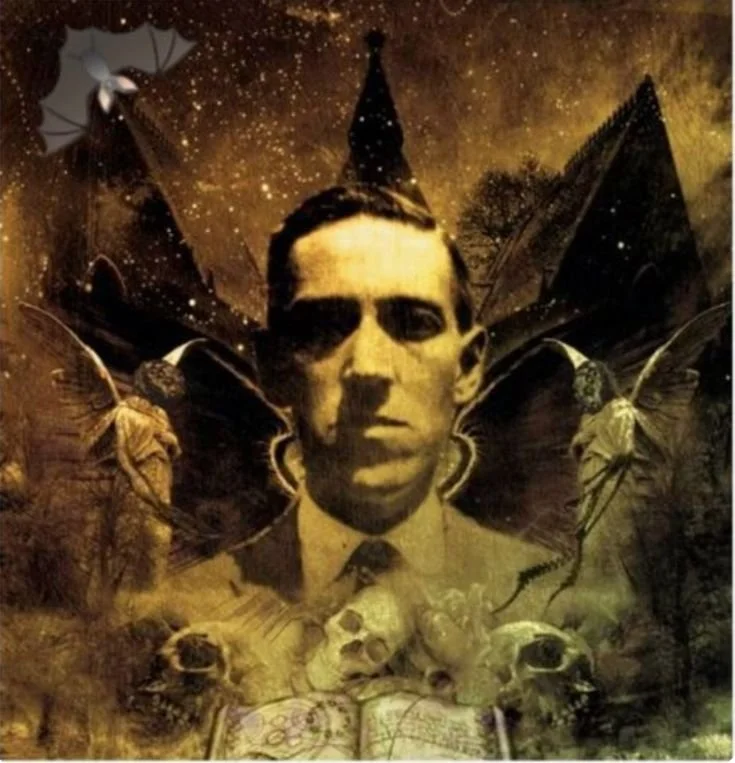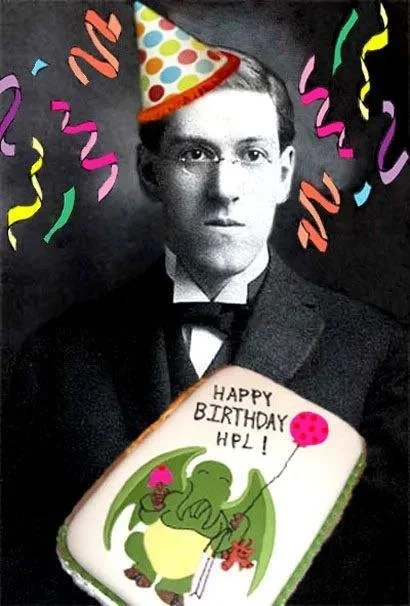Lovecraft at 135: Yeah, He Won
"I say, in all sincerity, that no writer, past or modern, has equalled you in the realm of bizarre fiction. (...) Your horror-tales are built starkly of black iron... And indeed, many writers of the bizarre are showing your influence in their work, not only in Weird Tales but in other magazines as well; earlier evidences of an influence which will grow greater as time goes on, for it is inevitable that your work and art will influence the whole stream of American weird literature, and eventually the weird literature of the world."
-- Extracts from Robert E. Howard's correspondence with H.P. Lovecraft
H.P. Lovecraft would’ve turned one hundred and thirty-five as of yesterday. That birthday also marks a solid century of pop culture influence. By this time in August of 1925, HPL had turned the heads of Clark Ashton Smith, Robert E. Howard and many, many others. ‘Others’ like C.L. Moore and Manly Wade Wellman. ‘Others’ like A. Merritt and E. Hoffmann Price.
I first read the name ‘H.P. Lovecraft’ by way of Glenn Lord and The Book of Robert E. Howard. Mr. Lord—may he rest in peace—is still the most important Robert E. Howard scholar in the history of REH scholarship. He tracked down “The Trunk”, he got Howard’s poetry published by Arkham House, he started one of the first REH fanzines, he made the deal with Roy Thomas to get Conan the Barbarian published by Marvel…and he was also a big Lovecraft fan—just like Howard. Glenn was a dues-paying member of The Esoteric Order of Dagon—the Lovecraftian version of REHupa—for well over a decade.
So, there I was, a kid, reading The Book of Robert E. Howard. This 'Lovecraft' guy seemed like a big deal, judging from what Mr. Lord had to say. He certainly sported an interesting name. A couple years later, I see The Shadow Over Innsmouth and Other Stories of Horror. This was in the catalog--The Weekly Reader--that Scholastic Book Services put out through various American schools. I was, like, "Let's check out this Lovecraft guy."
REH was in his late teens when he read his first Lovecraft--though he had also been reading A. Merritt, a kindred spirit and HPL inspiration. I was barely a teen and HPL hit me like a cyclopean hammer. The collection was good enough. It certainly established certain concepts in my mind, concepts I'd already seen in Howard's tales. As it turned out--despite the early start--I wouldn't read "The Call of Cthulhu" until I was eighteen. Maybe that was for the best, just like my reading of The Book of Robert E. Howard and The Second Book of Robert E. Howard before any Conan other than Conan the Conqueror helped me develop a far more balanced view of REH's overall oeuvre than just starting with the Lancer/Ace Conan anthologies.
So here we are, a century into Lovecraft's cultural hegemony in the horror field. What does that look like?
Robert M. Price is a 'controversial' figure. That doesn't make him wrong. I remember reading about his 'Cryptic Publications' stuff back in the '80s. My priorities were rock/metal and I put all that on the back-burner. Those various publications--many illustrated by Stephen Fabian--are worth plenty today. Price was, and is, a fan of HPL and REH. He has honored both--along with Clark Ashton Smith--many, many times.
So, when RMP writes about the century of Lovecraft's influence, I pay attention. As it turns out, he wrote an essay for The Lovecraft eZine back in 2015 called "Lovecraft Triumphant". I've been wanting to comment regarding this essay for a while. Let's be about it.
‘I was thinking how Lovecraft’s motifs and mythemes have so thoroughly permeated modern horror that the tail has come to wag the Tindalos Hound. The invader has devoured the host. In short, “Lovecraftian” fiction is within striking (or “spitting”?) distance of simply becoming modern horror. The genre, no longer a subgenre. No more merely a “literary cult,” as I believe Edmund Wilson called it, but the very mainstream of horror.’
Price is right. Despite early ankle-biters like Edmund Wilson and Asimov, Lovecraftian horror is now the 'default mode'/background for modern horror.
‘This doesn’t mean Lovecraftian fiction has dominated the field, that more of it is being produced than anything else, say than vampire fiction. Rather, I think that major elements of Lovecraftian fiction have become conventions of literary horror as a whole. When you read Laird Barron, Tom Ligotti, etc., etc., you can’t help recognizing elements we used to regard as uniquely Lovecraftian, but they have been baked into the cake in the manner of a presupposition, not so much a “shared world” (as in the pastiches, fan or pro, of an earlier generation) as a shared worldview. The Old Ones have become like the Satan of traditional horror fiction, one of the basic features of horror per se.’
This is undeniably true. The 'Enlightenment' brought its own set of demons/devils. The universe no longer 'cared'. Whatever was out there cared for Itself and looked upon us as we would a colony of ants—at best. That said, in some of Its guises, HPL’s Nyarlathotep is a good stand-in for Ol’ Scratch.
‘As Fritz Leiber said, Lovecraft performed a Copernican Revolution (as my mentor Robert F. Streetman used to say, “Another one?”) in horror, making science the focus rather than the supernatural. I am suggesting that HPL effected yet a second revolution, or maybe a tectonic shift, by causing the horror genre to assimilate so much of his vision and ideas that these are no longer Lovecraftian subgenre markers. We no longer think of vampire fiction as being “Bram Stokerism” even if it was he who started the ball rolling. Lovecraft coinages are now part of horror per se.’
Once again, spot on. We simply take ‘Lovecraftianisms’ for granted when reading horror nowadays.
Price references Stoker and vampire fiction. Many vampire novels written since 1975--the approximate date when HPL really began to dominate horror--have had an underlying 'feel' of cosmic horror. Thank Lovecraft, who wrote "The Shunned House" in 1926 and The Case of Charles Dexter Ward a few years later. Both feature strong themes of psychic vampirism, neither of which had any vulnerability to the traditional protections against vampirism as found in Stoker. These were cosmic vampires.
‘Don Burleson and I would call it a case of Derrida’s “iteration paradox.” Only once a thing gets repeated, is no longer unique, can we grasp its uniqueness by seeing what kind of a thing it is. So with Lovecraft. I think, too, of something Richard Tierney told me as we were taking a stroll in a cemetery many years ago. He said he was initially reluctant to attend conventions or join fan discussions because Lovecraft was something he cherished as a private treasure. It would be rendered profane insofar as it became common property, even with other fans, and thus rendered common. We see the same “danger” in the increasing academic recognition of Lovecraft, not to mention the light-hearted commercial appropriation of Lovecraft and all things Cthulhu. Octopus bedroom slippers, for Pete’s sake! Not that I’m complaining. It’s the iteration paradox.’
With cultural domination comes commercialization. It happens to every Western artist of note. None of it detracts from the basic value of the art in question. Lovecraft never thought his fiction was suitable ‘for the masses’.
‘Lovecraft has become less the thing we view and more the lens through which we view things. Lovecraft has become de-centered. He has triumphed in transcending himself.’
Once again, spot-on. If, as science and Classical Liberalism tell us, that 'the Universe simply does not care', then what Lovecraft lays out is more accurate than Heinlein or George Lucas. Alien is more accurate than Contact--or Star Trek.
I talked briefly with Joe R. Lansdale in a Brownwood BBQ joint back in 2013. I asked him about his Bubba-Hotep movie and his Lone Ranger comics--both of which contained Lovecraftian themes. He said, "Lovecraft is just there. Use him or not, he's just there."
I think many horror/fantasy fans have the wrong image of Lovecraft. Simply because he disagreed with Robert E. Howard on various points, some Howard fans look upon HPL as 'arrogant'. He was self-deprecating almost to a fault. He once referred to himself as a "non-entity". That is not the view of an egomaniac. Lovecraft encouraged young writers obviously less talented than himself until the day he died. Once again, not the actions of a narcissist.
Lovecraft was one of the first major pulp writers to praise Robert E. Howard--A. Merritt was another--and HPL immediately called for a collection of REH's fiction after Howard died. Lovecraft was a fan and a friend.
So, here we are, one hundred and thirty-five years after Lovecraft was born. The 'lens' of most horror fiction is now filtered through the cosmic horror paradigm Lovecraft refined and perfected—following the lead of Poe, Machen, Merritt and others.
One of the best examples of this—though, perhaps, unintended—was the HBO series, Lovecraft Country, in 2020. Inaccurate, dull and utterly not-scary, Lovecraft Country proved that HPL lived rent-free even in the minds of even his most ardent haters—almost ninety years after he died. Lovecraft, who isn’t known to have said a cross word to any Person of Color, simply had to be addressed and ‘dealt’ with.
Was--and is--”Lovecraft Triumphant”? Absolutely. Until our Western paradigm encompasses more than Classical Liberalism/Cosmic Materialism, then Lovecraft is the default setting.



